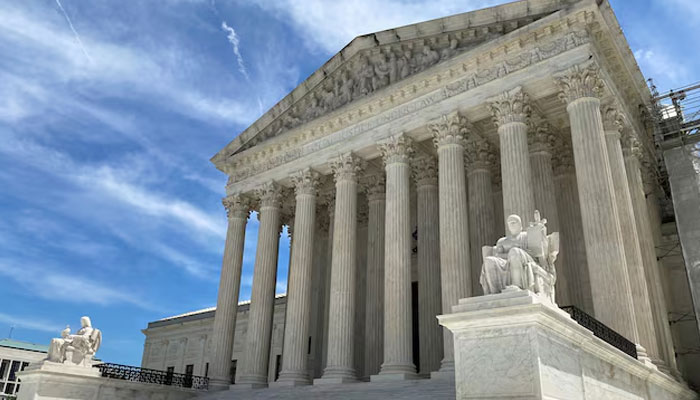Reuters/Ipsos poll: Americans don’t see Supreme Court as politically neutral
Justices are expected to issue rulings in major cases in coming weeks
WASHINGTON: Americans are divided on major issues that the US Supreme Court is due to rule on in the coming weeks, but most agree on one thing - neither Republicans nor Democrats see the nation’s top judicial body as politically neutral, according to a Reuters/Ipsos poll.
Just 20 percent of respondents to the poll agreed that the Supreme Court is politically neutral, while 58 percent disagreed and the rest either said they did not know or did not respond. Among people who described themselves as Democrats, only 10 percent agreed it was politically neutral and 74 percent disagreed, while among Republicans 29 percent agreed and 54 percent disagreed. The two-day poll, which closed on Thursday, was based on responses from 1,136 US adults. It had a margin of error of plus or minus 3 percentage points.
In the Reuters/Ipsos poll, 44 percent of respondents expressed a favorable view of the court, including 67 percent of Republicans and 26 percent of Democrats.
The Supreme Court’s popularity has declined since its June 2022 decision to overturn the 1973 Roe v. Wade ruling that had legalised abortion nationwide. Some 57 percent of respondents in a Reuters/Ipsos poll conducted at the end of 2021 expressed a favorable opinion of the court. By the end of June 2022, that figure had fallen to 43 percent.
The justices are expected to issue rulings in major cases in the coming weeks as they near the end of their current term that began in October. Among these cases are one on the legality of Tennessee’s Republican-backed law banning gender-affirming medical care for transgender minors and one involving Trump’s executive order restricting automatic birthright citizenship, part of his hardline approach to immigration.
Some 53 percent of respondents in the Reuters/Ipsos poll said they supported “laws that prevent transgender children under the age of 18 from getting medical treatment related to gender identity and gender transitioning”. Another 28 percent opposed such laws and the rest were unsure or did not answer the question.
Among Republicans, support for such laws was at 57 percent and opposition at 28 percent, while among Democrats support was at 23 percent and opposition at 54 percent.
After Trump signed his birthright citizenship directive in January, 22 states as well as immigrant rights advocates and pregnant immigrants sued, arguing that it was a violation of citizenship language in the US Constitution’s 14th Amendment.
In the Reuters/Ipsos poll, only 24 percent of all respondents supported ending birthright citizenship and 52 percent opposed it. Among Democrats, 5 percent supported ending it, with 84 percent opposed. Among Republicans, 43 percent supported ending it, with 24 percent opposed. The rest said they were unsure or did not respond to the question.
The court also by the end of this month is expected to issue a ruling on the legality of a Texas law that requires people to verify the age online before accessing pornographic websites.—Reuters
-
 Jerome Tang Calls Out Team After Embarrassing Home Defeat
Jerome Tang Calls Out Team After Embarrassing Home Defeat -
 Cynthia Erivo Addresses Bizarre Rumour About Her Relationship With Ariana Grande
Cynthia Erivo Addresses Bizarre Rumour About Her Relationship With Ariana Grande -
 Prince Harry, Meghan Markle Spotted Cosying Up At NBA All-Star Game
Prince Harry, Meghan Markle Spotted Cosying Up At NBA All-Star Game -
 Lady Gaga Explains How Fibromyalgia Lets Her 'connect With People Who Have It'
Lady Gaga Explains How Fibromyalgia Lets Her 'connect With People Who Have It' -
 Metro Detroit Weather Forecast: Is The Polar Vortex Coming Back?
Metro Detroit Weather Forecast: Is The Polar Vortex Coming Back? -
 Daniel Radcliffe Reveals Surprising Way Fatherhood Changed Him
Daniel Radcliffe Reveals Surprising Way Fatherhood Changed Him -
 ‘Disgraced’ Andrew At Risk Of Breaking Point As Epstein Scandal Continues
‘Disgraced’ Andrew At Risk Of Breaking Point As Epstein Scandal Continues -
 Alan Cumming Shares Plans With 2026 Bafta Film Awards
Alan Cumming Shares Plans With 2026 Bafta Film Awards -
 OpenClaw Founder Peter Steinberger Hired By OpenAI As AI Agent Race Heats Up
OpenClaw Founder Peter Steinberger Hired By OpenAI As AI Agent Race Heats Up -
 Kate Middleton's Reaction To Harry Stepping Back From Royal Duties Laid Bare
Kate Middleton's Reaction To Harry Stepping Back From Royal Duties Laid Bare -
 Rose Byrne Continues Winning Streak After Golden Globe Awards Victory
Rose Byrne Continues Winning Streak After Golden Globe Awards Victory -
 Ice Hockey Olympics Update: Canada Stays Unbeaten With Dominant Win Over France
Ice Hockey Olympics Update: Canada Stays Unbeaten With Dominant Win Over France -
 Brooklyn Beckham Makes This Promise To Nicola Peltz Amid Family Feud
Brooklyn Beckham Makes This Promise To Nicola Peltz Amid Family Feud -
 Chinese New Year Explained: All You Need To Know About The Year Of The Horse
Chinese New Year Explained: All You Need To Know About The Year Of The Horse -
 Canadian Passport Holders Can Now Travel To China Visa-free: Here's How
Canadian Passport Holders Can Now Travel To China Visa-free: Here's How -
 Maya Hawke Marries Christian Lee Hutson In New York Ceremony
Maya Hawke Marries Christian Lee Hutson In New York Ceremony




